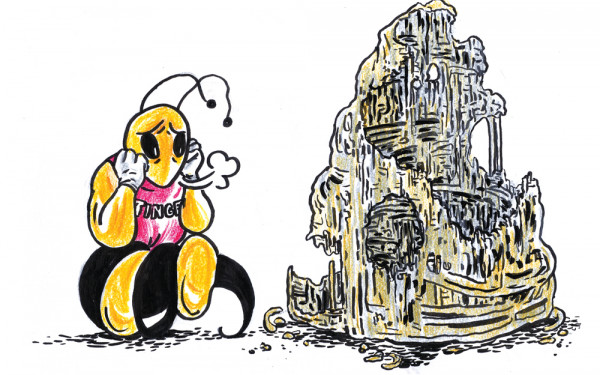The Student Cafe You Won’t See in September
“The Hive” Loyola Is Looking for Might Take a While
Walk up the stairs from the cafeteria at Concordia’s Loyola campus and you won’t see much.
You’ll see some old, mismatched furniture, a solitary bar and a big empty room.
You won’t see the business plan, the fully developed design concept or the thousands of dollars of renovations costs that have been geared towards turning that space into a student-run restaurant and café called The Hive.
And chances are, you won’t be seeing that anytime soon.
For years, the project has been blocked by logistical, financial and ideological conflicts that are preventing the dream from becoming a reality.
For about a year, a big blue tote bag full of thick white binders covering everything from the space’s logo design to the free-range farm where they could potentially get their chicken has been gathering dust.
There’s a restaurant permit request with everything filled in but the signature.
Cameron Stiff, who was paid to take the project under his wing, put those binders together from 2010 to 2012 is still baffled The Hive isn’t yet buzzing with activity.
“I spent over two years of my life bringing this project from just an idea to an actual plan,” he said. “The plans were done. The business plan was done, the architectural plans were done and the university was on board.”
Living in the Shadow
It’s no mystery that CUSACorp, the for-profit arm of the Concordia Student Union, is struggling.
At the moment, Reggie’s Bar, via CUSACorp, owes the CSU $1.4 million, incurred through deficit bailouts and locations costs.
Former VP Loyola and current The Link columnist Melissa Fuller and former VP Finance Jordan Lindsay both said they would have loved to see the plan realized under their mandate.
That said, when following the advice from the CSU’s then-general manager Michele Dumais, the prospect of opening yet another business while one floundered was shortsighted at best.
Stiff isn’t ready to accept that explanation.
Without incurring costs such as rent, alongside virtually zero competition, Stiff said, it’s practically a given that The Hive would thrive.
He says that The Hive shouldn’t suffer because of failures of CUSACorp, what he calls the CSU’s “shadow organization.”
Stiff argued that grant money would offset large portions of the cost, and that money from the union’s student centre fund could be used to kick it off.
A former Loyola student himself, he said that such a business would be virtually risk-free because the demand for a café at Loyola is so high.
For Fuller, however, that way of thinking is just too simplistic.
“There’s a risk,” she said. “There’s always a risk.”
Loyola’s Potato
But issues with CUSACorp run much deeper than the union’s pockets.
As a business, The Hive would naturally need to run as a CUSACorp subsidiary. CUSACorp employees are not unionized—something Fuller says is just too expensive for a company constantly in the red.
Monday through Friday, however, three employees of the CSU run a not-for-profit soup kitchen out of The Hive, a sort of Loyola-campus version of the People’s Potato called the Loyola Luncheon.
As CSU employees, they are unionized.
Under Fuller’s mandate, keeping the luncheon running was a top priority, but doing so meant that it wasn’t possible to bring non-unionized workers into the same kitchen filled with unionized workers.
While Stiff outlined a few options around this, such as unionizing CUSACorp employees or giving out a regulated number of free meals per month through The Hive, he saw one much simpler solution—ditch the Luncheon.
This option was something Fuller and Stiff were never able to agree on, and it contributed to the breakdown of their working relationship.
Fuller was committed to ensuring Loyola students had access to free food, so that those struggling with finances could still get a full meal.
Stiff, however, just didn’t believe it was a well-built enough service to be worth preserving.
“There was nothing around [the Luncheon], there was no politics there was no programming, nothing. There was just, ‘Show up for a crappy lunch,’” he said.
“And that’s the reason that you can’t open a café?”
Renovations and Accessibility
While the Loyola Luncheon might be holding The Hive back right now, it’s also helped the project progress get as far as it did.
Around $80,000 of renovations went into making The Hive capable of supporting the Luncheon. Those renovations paid for the industrial-sized stove any restaurant would need.
But that’s not to say the place is restaurant-ready. Around one of the many proposed launch dates for the café, the CSU realized that the structure’s limited electrical output wasn’t enough for the demanding needs of a restaurant.
This summer, Concordia’s administration intends to fix that. They still need a signature from the current CSU, but they have a verbal agreement to begin construction as early as the summer.
That work will see the space receive new counters, improvements to the service areas and a boost to the building’s electrical capacity.
There will still be questions of accessibility, however. Up a flight of winding and steep stairs, any restaurant in The Hive would hardly be wheelchair accessible.
But by September, it’s very possible the room itself would be ready to support a plan as grand as Stiff’s.
VP Loyola’s Progress
After taking over outgoing VP Loyola Melissa Fuller’s position over the summer, current VP Loyola Stefan Faina instituted a few social events at Loyola, but long-term projects have been put on hold.
Faina says that The Hive Café has been the biggest challenge in terms of projects to date.
“The problem with this project is that there’s been things that have been done with it, but the turn-over of the CSU really impedes the progress,” he said.
Faina says that some of the problems lie in the revolving nature of the student union—that it’s difficult to pick up where a year of someone else’s work has left off.
However, to help the process, this year’s executive will have one month of training where they will teach their portfolio to their incoming replacements—a longer period of time than in previous years.
“I’m going to try and speak as much as I can to the incoming execs,” he said. “One month is not necessarily enough [for training]. I really want to outline exactly what I’ve done and what I recommend to follow through with once my mandate is finished.”
But until now, The Hive has been a somewhat sore spot in his portfolio.
Although Fuller attempted to get the project off the ground, Faina has only recently picked up where she left off, and admitted that his involvement in the project is coming too late in the year.
“I was hesitant to speak to last year’s executives who were current councillors,” he said. “But when I did speak to them they gave me their perspective on what it was that was missing.”
However, it was only very recently he sought council’s advice.
“The Hive Café, although it was never one of my campaign points, was definitely something I think I should have spent more time on, on figuring out exactly what it was that was missing,” he said.
“Figuring out exactly what it was that needed to be done so I could finish the end of my year, the end of my mandate with my head held high, and that I contributed something, and that’s what I’m trying to do now.”
Since the beginning of fall semester, Faina has been working on planning social events to be held at Loyola.
Although the majority of executive positions do not have to rely on other executives to fulfill their duties, Loyola does not have its own budget for events and CSU services, so Faina had to work through VP Student Life Alexis Suzuki in order to secure funding.
“That would be something that I’d like to see in the future—a Loyola budget,” he said. “It would make sense, in my opinion. I’ve had to speak to Alexis a lot this year. I’d like to be less dependent on another executive when it comes to this sort of thing. I’m sure a lot of students would like to see that, too.”
Concordia’s Forgotten Child
Tuesday kicks off the CSU elections, and as she’s running uncontested, it’s very likely that Crystal Harrison will become the CSU’s newest VP Loyola.
Transforming The Hive into a fully functional café, and perhaps even a bar, is one of her main platform points.
She wants a “full launch” of The Hive by September. Fuller and Lindsay said it doesn’t need to be so difficult—so long she’s not striving for anything extremely impressive.
What could work, they say, would be something as simple as setting up a coffee machine. They say Harrison will need to get students accustomed to the idea of a café with something as simple as coffee. There would be no need for extended construction, no need to mix employees in the kitchen.
Once that initiative begins to turn a profit, the former execs say, Harrison could then start selling simple food, like muffins and pre-wrapped sandwiches. Bit by bit, investing profits could bring the café to the next level.
Of course, a plan like that means Harrison won’t see much under her mandate. It will take several years of successful student unions, proper management and regular improvement to build something truly impressive.
It means that no single executive will get to include launching The Hive full-force in their legacy, and that a few years of hard work could easily be undone by a single incompetent union.
It also means that Stiff’s work, and the work of the many designers and architects consulted will be largely in vain, at least, for the foreseeable future.
But Stiff says that if such is the case, the university will lose more than that—that it will lose the opportunity to change the face of an entire campus, the opportunity to build something that might revitalize what he calls “a ghost town after 7:00 p.m.”
“Loyola is the ugly little sister, the ugly little brother, the forgotten child of Concordia,” he said, adding that the right commitment and vision to the Hive could change all that.
“It’s got to happen.”

_900_598_90.jpg)



_600_375_90_s_c1.jpg)
